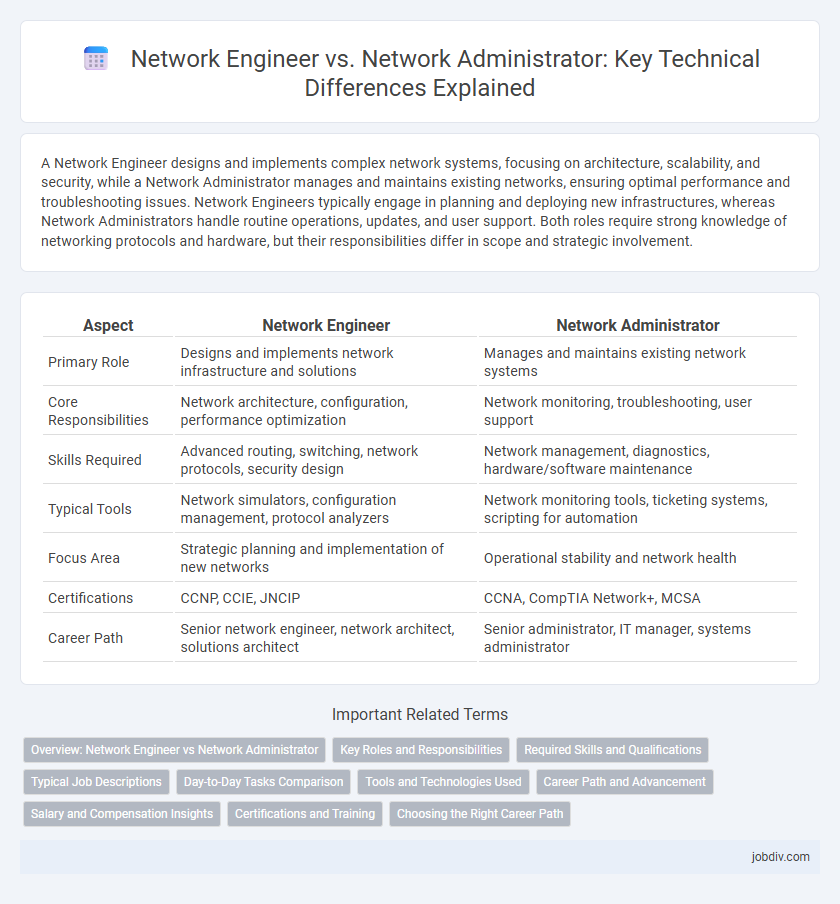A Network Engineer designs and implements complex network systems, focusing on architecture, scalability, and security, while a Network Administrator manages and maintains existing networks, ensuring optimal performance and troubleshooting issues. Network Engineers typically engage in planning and deploying new infrastructures, whereas Network Administrators handle routine operations, updates, and user support. Both roles require strong knowledge of networking protocols and hardware, but their responsibilities differ in scope and strategic involvement.
Table of Comparison
| Aspect | Network Engineer | Network Administrator |
|---|---|---|
| Primary Role | Designs and implements network infrastructure and solutions | Manages and maintains existing network systems |
| Core Responsibilities | Network architecture, configuration, performance optimization | Network monitoring, troubleshooting, user support |
| Skills Required | Advanced routing, switching, network protocols, security design | Network management, diagnostics, hardware/software maintenance |
| Typical Tools | Network simulators, configuration management, protocol analyzers | Network monitoring tools, ticketing systems, scripting for automation |
| Focus Area | Strategic planning and implementation of new networks | Operational stability and network health |
| Certifications | CCNP, CCIE, JNCIP | CCNA, CompTIA Network+, MCSA |
| Career Path | Senior network engineer, network architect, solutions architect | Senior administrator, IT manager, systems administrator |
Overview: Network Engineer vs Network Administrator
Network Engineers design and implement complex network solutions, focusing on architecture, scalability, and performance optimization. Network Administrators maintain and troubleshoot existing networks, ensuring stability, security, and efficient operation. While Engineers handle advanced planning and deployment, Administrators focus on day-to-day network management and support.
Key Roles and Responsibilities
Network Engineers design, implement, and optimize complex network infrastructures, focusing on scalability, performance, and security to support organizational IT goals. Network Administrators manage day-to-day network operations, including monitoring, troubleshooting, and maintaining network hardware and software to ensure reliable connectivity. Both roles require expertise in protocols such as TCP/IP, routing, and switching, but Engineers emphasize strategic network architecture while Administrators handle operational stability and user support.
Required Skills and Qualifications
Network Engineers require advanced knowledge in network design, routing protocols such as BGP and OSPF, and experience with network hardware like Cisco routers and switches. Network Administrators need strong skills in network maintenance, troubleshooting, and managing network security systems, often with proficiency in Windows Server environments and network monitoring tools. Certifications such as Cisco CCNP for Engineers and CompTIA Network+ for Administrators are commonly sought qualifications.
Typical Job Descriptions
Network Engineers design, implement, and optimize complex network infrastructures, focusing on scalability, security protocols, and performance monitoring using tools like Cisco IOS and Wireshark. Network Administrators manage daily network operations, configure routers and switches, and ensure system stability through routine maintenance and troubleshooting. Both roles require proficiency in TCP/IP, network hardware, and software, but engineers typically engage in strategic planning while administrators handle operational continuity.
Day-to-Day Tasks Comparison
Network Engineers design, implement, and optimize network infrastructure, focusing on complex configurations, troubleshooting, and performance tuning of routers, switches, and firewalls. Network Administrators manage day-to-day network operations, including monitoring network performance, maintaining hardware and software, and resolving routine connectivity issues. Both roles require strong knowledge of protocols like TCP/IP and tools such as Wireshark and Cisco IOS but differ in scope and level of strategic involvement.
Tools and Technologies Used
Network Engineers primarily utilize advanced tools such as Cisco IOS, Wireshark, and GNS3 for designing, configuring, and troubleshooting complex network infrastructures. Network Administrators often rely on network management software like SolarWinds, Nagios, and Microsoft System Center to monitor and maintain network performance and security. Both roles require proficiency with protocols like TCP/IP, DNS, and DHCP, but Network Engineers focus more on implementation while Administrators emphasize operational management.
Career Path and Advancement
Network Engineers typically engage in designing and implementing complex network infrastructures, positioning themselves for advanced roles such as Network Architect or Security Specialist through continuous skill development in protocols, routing, and cloud technologies. Network Administrators focus on maintaining and troubleshooting existing networks, gaining expertise in network management and support that can lead to senior administrator or IT manager positions. Advancing in either career path requires certifications like CCNA, CCNP, or CompTIA Network+, which validate skills critical for leadership and specialized technical roles.
Salary and Compensation Insights
Network Engineers typically earn higher salaries than Network Administrators, with median annual wages ranging from $75,000 to $110,000, reflecting their advanced responsibilities in designing and implementing complex network systems. Network Administrators generally receive compensation between $55,000 and $85,000, focusing on maintaining and troubleshooting existing networks. Salary variations depend on factors such as certification levels (CCNA, CCNP), geographic location, and years of experience in the IT industry.
Certifications and Training
Network Engineers typically hold advanced certifications such as Cisco Certified Network Professional (CCNP) or Certified Information Systems Security Professional (CISSP), reflecting their expertise in designing and implementing complex network systems. Network Administrators often possess certifications like Cisco Certified Network Associate (CCNA) or CompTIA Network+, emphasizing skills in maintaining, troubleshooting, and managing existing networks. Both roles require continuous training to stay updated with evolving technologies, but Network Engineers usually engage in more specialized and high-level technical courses.
Choosing the Right Career Path
Network engineers design and implement complex network solutions focusing on scalability and performance optimization, while network administrators maintain and troubleshoot existing network systems to ensure operational continuity. Choosing between these career paths depends on interests in proactive network architecture versus reactive maintenance and support roles. Skills in routing, switching, and network security are essential for engineers, whereas administrators benefit from expertise in network monitoring, configuration management, and user support.
Network Engineer vs Network Administrator Infographic

 jobdiv.com
jobdiv.com